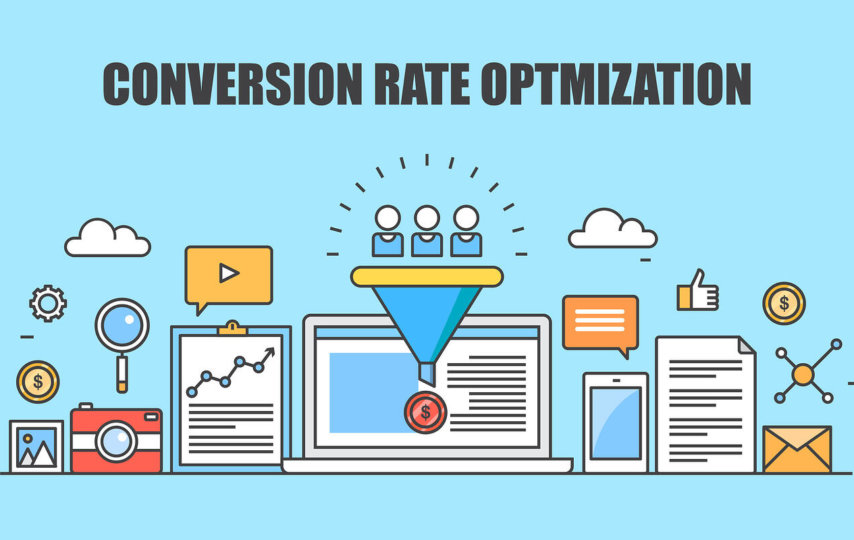Most people forget that Conversion Rate Optimization (CRO) and Search Engine Optimization (SEO) are not two different things but two different lenses on the same problem. The two strategies have a surprisingly high overlap in both approach and for driving results.
SEO and CRO processes complement each other and by combining the approach adds another dimension that hopefully increases the probability of success by aiming for the intersection of both approaches. Search optimization focuses on how you look to the outside world. These are the clothes you wear and how you position yourself. Conversion rate optimization is internally and has everything to do with demonstrating a healthy body. Presumably, this will allow us to find the best strategy to make us look good inside and out.
The real world reality of optimizing eCommerce sites may not be quite as glamorous but even small improvements in both SEO and CRO percentages, can have a huge cumulative impact on the store’s success.
SEO for product pages begins with delivering original content designed to stand out from your competitors. Keyword research helps focus the content strategy around the phrases that best connect with buyers. In the SEO for eCommerce world, it’s not enough to draw traffic if you can’t draw traffic that converts. Connecting the conversion strategy to the visibility strategy makes sure that you aren’t just bringing traffic to your site, but that you are bringing potential buyers.
This approach requires a common metric that is equally appropriate for SEO and CRO. With a common metric the two approaches can be synchronized. This comment metric is not “rank” or “share of voice” the metric that all eCommerce programs are centered around should be revenue and determining what it takes to get the customer to hit the buy button.
With a metric now in place, we need some strategies to test. eCommerce optimization is all about 1) communicating what you have to sell, 2) build some trust and 3) make it easy to buy. And these are good places to look for strategies. Keyword research will help you understand which words attract well and which keywords convert well. Testing shows that blending both volume (attracts) with value (converts), you can generate more revenue more than just focusing your keyword research on search volume.
While the focus of SEO is to boost traffic on your site, CRO is responsible for converting that traffic by encouraging visitors to take some action (fill out a contact form, sign up for newsletter or purchase) and show intent. So, it’s the CRO that can help you convert the people you drive to your site using SEO.
Why Do You Need Both CRO And SEO?
Digital marketers often combine CRO and SEO to ensure desired traffic, rankings conversions and sales for websites or businesses. Without the SEO efforts, your conversion optimization will fail to fetch any real benefits. That’s why you often need both to excel in the digital world. There are more reasons why you may need both as part of your digital marketing strategy –
- While you need SEO to achieve higher website rankings in search engines and attain better online visibility, CRO is essential to meeting your visitors’ needs and converting them.
- Even if your SEO is good, it will fetch nothing unless the site is optimized for conversions after considering the needs of your audience.
- You will be able to do an effective CRO and optimize your website conversion rate only when there are higher levels of traffic through the use of SEO.
- SEO alone can never prove effective on landing pages and its elements for getting direct traffic as such key pages require CRO as well to boost conversion rates and online revenue.
- Doing CRO without knowing and improving SEO efforts could mean wasting time in optimizing high bounce rate pages not caused by poor design or poor usability but by poor quality of keywords selection.
Clearly, marketers and website owners should engage in both if they want to achieve higher online revenues and profits in the long run and aim to get the lion’s share in the market.
Could CRO factors affect your SEO?
There are some CRO factors that could affect your SEO efforts and neutralize your hard work.
- When your website has poor quality content or when it loads slowly, it can not only lower the conversion rates but can also keep the site lower in SERPs than those having higher quality content and faster loading speed.
- Your website will have lower visitor engagement and lower conversion rates if you do a bad job with e-commerce SEO and send irrelevant traffic to the site.
- You can monitor and improve success of both SEO and CRO by relying on web analytics data and both use many metrics and among them the most important is website bounce rate.
- More inbound links are achieved by a web page that is well optimized for CRO and this can help improve your site’s search engine rankings further.
Importance of CRO to SEO
Most businesses aim to drive conversions and earn profits, which is not possible without a solid online presence and a high search engine ranking. This is why digital marketers should devise an integrated approach to leverage the best of CRO and SEO together and achieve the best results for clients.
Here are ways in which CRO can add value to SEO strategy –
1. Target the Right Keywords
If you think having a high search engine ranking is enough, think again. In fact, if you don’t rank for the right keywords you just can’t attract potential customers to your website. It’s also important to have a clear understanding of the target audience and the search queries they could use. Thanks to CRO strategy, you can always use long tail keywords to focus on a more specific audience on search engines.
2. Optimize the Right Pages
While some parts of your website should be optimized for conversions, there will always be other parts which you also need to optimize for search queries. You need to know the purpose of each page on your website and then optimize them accordingly for SEO and CRO. This shows search engine ranking is not alone to help your website grow and you also need the site elements optimized for conversions at the same time.
3. Have a user-friendly Design
Sites that deliver better user experience (UX) get more preferences in search engines. In fact, you could improve visitor engagement and drive more conversions through enhanced UX. This clearly shows how steps taken for ecommerce conversion optimization (improving page speed, simplifying navigation and making the pages responsive to mobiles) can also positively impact your search engine performance. You can thus insert engaging videos and attractive graphics in your website design to catch visitor’s attention.
4. Content is always the king
High-quality content is always a huge factor for both CRO and SEO where the top paragraph needs to-the-point content to convey brand message effectively whereas the later optimizes content for targeted keywords. In both the cases, you should have original, relevant and error-free content with topical images, graphs, videos to make the content more engaging and drive more conversions.
5. Test and Control
The use of test and control group pages is important in CRO to know which web pages can deliver better conversions. Marketers can also use the test and control test data to engage visitors from search engines. This is how the bounce rate is improved to positively affect your site’s rankings in search engines.
Final thoughts
Even if CRO and SEO are different, they complement each other in many ways and overlap as well. In fact, it’s your CRO strategies that can work as a foundation stone for success in search engine rankings. That’s why you need an integrated approach to combine the best from conversion rate optimization and search engine optimization to drive your website ahead on the web.













